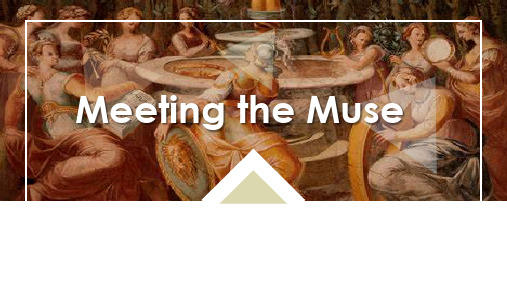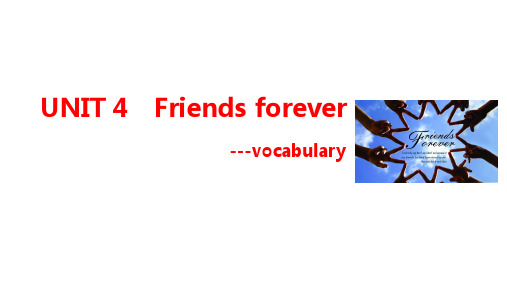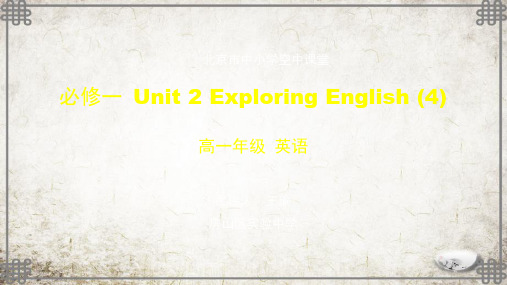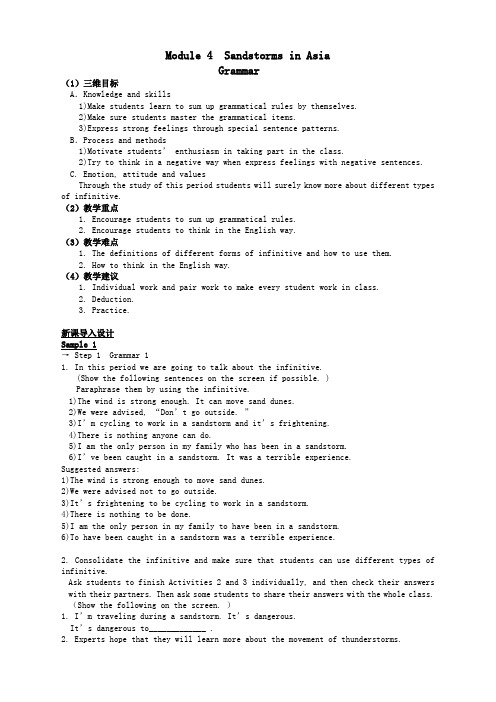外研版高中英语必修一教学课件:unit 4 Period 3
外研版选择性必修一 Unit4 using language 英语课件

3 Do you want to go to this exhibition after reading the comments? Why or why not?
Activity 7
Answer the questions.
1 What do art exhibitions enable us to do? 2 What are the general themes of art exhibitions? 3 What else do you know about Pablo Picasso and Feng Zikai? 4 What other artists are famous for representing war and peace? What are their best-known artworks?
would love to know what she was going to say!
I didn't realize he was a famous singer until he took off his dark glasses. It was not _____ he took off his dark glasses _____ I realized he was a famous singer.
Activity 2
直到昨天我才知道这件事。 I didn't learn it until yesterday. It was not until yesterday that I learned it.
高中英语 外研版新教材必修一unit4 vocabulary 课件 (共29张PPT)

高中英语 必修第一册 UNIT 4 Friends forever
单句写作
(1) His good health enables him to (使 得他能够)work hard. (2) Modern communications enable more and more people (使越来越多的人能在家里工作)to.work at home (3) 飞机使人们能够很快地远距离旅行。
高中英语 必修第一册 UNIT 4 Friends forever
词汇四 deliver(1)vt. & vi. 递送;传达(2)vt. 发表
(3)vi. 接生,助产;分娩,生产
deliver sth. to sb. 把某物运送给某人
deliver a speech/lecture 发表演讲
deliver a baby生小孩
Airplanes/Planes enable people to travel long distances rapidly.
高中英语 必修第一册 UNIT 4 Friends forever
词汇十 tend v. 易于做某事,往往会发生某事
【要点必记】 tend to do sth. 易于做某事,往往做某事 tend to/towards 倾向于,趋于 tend(to)sb. /sth. 照料/ 护理某人;照管某事物 构词: tend v. → tendency n. 趋势;倾向 There is a tendency(for sb.)to do sth.(某人)有做某事的 倾向。
高中英语 必修第一册 UNIT 4 Friends forever
单句写作
(1) The modern furniture design tends
外研版高中英语必修一《Friends forever》Section Ⅲ说课教学课件

审题谋篇 项目 体裁 话题 时态 人称
Unit 4 Friends forever
结论 议论文 处理人际关系 一般现在时 第一、三人称
栏目 导引
词句推敲 1.词汇 ①存在 ②焦虑 ③发脾气 ④对……充耳不闻 ⑤吵架 ⑥与某人关系不好 ⑦记住…… ⑧反过来
Unit 4 Friends forever
栏目 导引
Unit 4 Friends forever
5.She took photographs of the things and people ______she was interested in. 6.Look, here are some people _______________w___ I want you
栏目 导引
Unit 4 Friends forever
2.whom 指人,在定语从句中作宾语,可省略,也可用 who 代替。 ◆Rose is the person (who/whom) you should care about. 罗丝是你应该关心的人。(作宾语) 3.whose 可修饰人,也可修饰物,表“所属”关系,whose 在 定语从句中作定语。 ◆Any student whose family is too poor to go to school can get
help from the government. 任何家境贫寒,上不起学的学生都可以得到政府的帮助。(whose 引导定语从句作定语) ◆He lives in a room whose window faces north. 他住在一个窗子朝北的房间里。(修饰物)
栏目 导引
Unit 4 Friends forever
4.which 指事物,在定语从句中作主语、宾语或表语,作宾语 时可省略。 ◆China is a country which has a long history. 中国是一个具有悠久历史的国家。(作主语) ◆The radio (which) he bought yesterday doesn’t work. 他昨天买的收音机坏了。(作宾语) ◆This is the house in which I once lived. 这是我曾经住过的房子。(作介词 in 的宾语)
高一【英语(外研版)】必修一 Unit -4-课件

My experience
Of course, I’m not a chicken. No, you don’t know what I mean.
…
Do you like Bungee Jumping? I know you are not a chicken. You are a beauty. I do know what you say.
Read the following expressions and guess
their meanings. Then discuss in pairs.
What’s up?
ring a bell
small potatoes
toilet water
at sixes and sevens
green fingers
Green hand Couch potato Horse sense
Rest room the Yellow Pages
A book that contains the telephone numbers of businesses and organizations
Common sense
A room with a toilet
a. (British English) the floor of a building above the one at ground level (American English) the floor of a building at ground level
b. pretty good, better than you expected c. unable to speak clearly for a short time because your
外研版选择性必修一Unit 4 Meeting the muse Using language 课件

表达态度
voice/state one’s attitude Check out the ground-breaking installations. 1) (informal) to look at or examine a person or thing that seems interesting or attractive 察看,观察(有趣 或有吸引力的人或事物)
Check out the prices at our new store! 看一看我们新商店的价格吧!
Hey, check out that car! 嘿,看看那辆车!
We'll have to check him out before we employ him. 我们得先调查一下再雇用他。 2) to find out if sth is correct, or if sb is acceptable 调 查;查证;核实
Did You Know?
2. What other artists are famous for representing war and peace? What are their best-known artworks?
Discussion:
Now work in pairs. Discuss which artwork makes the greater impression on you and why. Listen again if necessary.
Choose an art exhibition, or an artwork from an exhibition you like, and write about it using the words and expressions in this section.
外研社高一英语必修一Unit4 Period4 Grammar课件

授课教师:
Step 1 Lead-in
Past
Present
In the Future
Step1 Lead-in
share the same__________
two____________
two strangers_________
a_________
Using Language Attributive Clause (1)
Step2 Activity-1
e.g. I like honest friends. e.g. I like friends who are honest.
Step 2 Activity-2 That is the person whom/who/that you want to see.
2) They applaused to the professor whom we visited yesterday.
They applaused to the professor who teaches us.
Step3 Activity-4
Step 3 Activity-5
Good morning, ladies and gentlemen. Today we invite a student from...to tell us something about his/ her story with his/ her friend. Please welcome...!
This is theht yesterday.
I know the man whose daughter is a doctor. 关系代词 人 物
英语必修ⅲ外研版module4period3教案

Module 4 Sandstorms in AsiaGrammar(1)三维目标A.Knowledge and skills1)Make students learn to sum up grammatical rules by themselves.2)Make sure students master the grammatical items.3)Express strong feelings through special sentence patterns.B.Process and methods1)Motivate students’ enthusiasm in taking part in the class.2)Try to think in a negative way when express feelings with negative sentences.C. Emotion, attitude and valuesThrough the study of this period students will surely know more about different types of infinitive.(2)教学重点1. Encourage students to sum up grammatical rules.2. Encourage students to think in the English way.(3)教学难点1. The definitions of different forms of infinitive and how to use them.2. How to think in the English way.(4)教学建议1. Individual work and pair work to make every student work in class.2. Deduction.3. Practice.新课导入设计Sample 1→ Step 1 Grammar 11. In this period we are going to talk about the infinitive.(Show the following sentences on the screen if possible. )Paraphrase them by using the infinitive.1)The wind is strong enough. It can move sand dunes.2)We were advised, “Don’t go outside. ”3)I’m cycling to work in a sandstorm and it’s frightening.4)There is nothing anyone can do.5)I am the only person in my family who has been in a sandstorm.6)I’ve been caught in a sandstorm. It was a terrible experience.Suggested answers:1)The wind is strong enough to move sand dunes.2)We were advised not to go outside.3)It’s frightening to be cycling to work in a sandstorm.4)There is nothing to be done.5)I am the only person in my family to have been in a sandstorm.6)To have been caught in a sandstorm was a terrible experience.2. Consolidate the infinitive and make sure that students can use different types of infinitive.Ask students to finish Activities 2 and 3 individually, and then check their answers with their partners. Then ask some students to share their answers with the whole class. (Show the following on the screen. )1. I’m traveling during a sandstorm. It’s dangerous.It’s dangerous to_____________ .2. Experts hope that they will learn more about the movement of thunderstorms.Experts hope to_____________ .3. We were told, “Don’t leave the house. ”We were told not_____________ .4. The men need to complete the work on the house by the end of the week.The work on the house needs to_____________ .5. It seems that most houses have been destroyed by the storm.Most houses seem to_____________ .Suggested answers:1. travel during a sandstorm2. learn more about the movement of thunderstorms3. to leave the house4. be completed by the end of the week5. to have been destroyed by the storm(Show the following on the screen. )1. It’s frightening_____________ (walk)in the road in a sandstorm. I hope I reach home soon.2. Experts hope_____________ (learn)more about the movement of thunderstorms.3. I’d like_____________ (tell)about the situati on before now.4. The work needs_____________ (complete)by the end of the week.5. My father was out of the city when the sandstorm came. He was very glad_____________(miss)it.6. The building has_____________ (finish)by the end of this year.7._____________ (see)a real sandstorm was very frightening.Suggested answers:1. to walk2. to learn3. to be told4. to be completed5. to have missed6. to be finished7. To seeSample 2 Grammar 2短语but+不定式介词but后面跟不定式的情况有以下几种:1. can’t help but+原形动词。
高中英语外研版必修一《Module 1 Section Ⅳ》课件

encouraging 令人鼓舞的
interesting 有趣的
astonishing 令人惊呆的
surprising 令人惊奇的
frightening 令人害怕的
tiring
令人厌倦的
amazing
令人惊讶的
boring
令人讨厌的
exciting
令人兴奋的
embarrassing 令人尴尬的
disappointing 令人失望的
8.I _d_o_ (do) all the cooking for my family, but recently I've been too busy to do it.
9.The story he told us was very _m__o_v_in_g_ and we were _m_o_v_e_d_ deeply.(move)
考点二 现在进行时 1.表示说话时正在进行的动作,常与时间状语 now,at the moment 等连用。 I am writing a letter.Will you please turn down the radio? 我正在写信,请把收音机的音量调小一点儿,好吗? 2.表示现阶段正在进行而此刻不一定进行的动作。 How are you getting on with your physics this term? 这一学期你的物理学习怎么样?
4 . I am very happy to hear that he has made amazed progress._am__a_z_e_d_→__a_m_a_z_in_g_
5.—You played the piano so well.
—Thanks.I learned for four years when I was young.__p_la_y_e_d__→__p_la_y_
- 1、下载文档前请自行甄别文档内容的完整性,平台不提供额外的编辑、内容补充、找答案等附加服务。
- 2、"仅部分预览"的文档,不可在线预览部分如存在完整性等问题,可反馈申请退款(可完整预览的文档不适用该条件!)。
- 3、如文档侵犯您的权益,请联系客服反馈,我们会尽快为您处理(人工客服工作时间:9:00-18:30)。
1.与现在完成时连用的典型单词、短语和句型 (1)since since 表示“自从……以来”时 ,无论是用作介词、连词还是副 词,since 都通常要与现在完成时连用。 I’ve had nothing to eat since lunchtime. 从午饭时间到现 在我什么都没吃。 (2)in the last / past+一段时间 表示从现在算起的过去一段时间内,通常要与现在完成时连用。
通过观察以上句子,我们发现第 1 组句子中,下划线动词是(1) 动词,动作已经(2) ,但是对现在产生影响;第 2 组 句子中下划线动词是 (3) 动词 ,动作延续到现 在;第 3 组句子中下划线的动词发生过多次;第 4 组句子中下划线 的动词发生在(4) 。
【答案】(1)非延续性 (2)完成 (3)延续性 (4)将来
【答案】1.has;bought 2.was 3.has gone 4.Have;seen 5.woke;heard 6.have taken 7.has been 8.received 9.finishes 10.have read
现在完成时态 阅读下列几组句子,总结现在完成时表达的意义。 1. (1)I have lost my pen. Can I use yours? (2)We have finished the work, so we can go home. (3)He has seen the film several times, so he is very familiar with it. 2. (1)I have waited a week for your answer.
Period 3
Grammar
识记、理解并能自主应用现在完成时态。 1.掌握现在完成时态表达的意义。 2.区分现在完成时和一般过去时的区别。
重点语法 现在完成时态
用所给词的适当形式填空 1.Mrs Bush just daughter.
(buy) an iPod for her
2.Shelley (be) here just nቤተ መጻሕፍቲ ባይዱw. 3.My mother isn’t in.She (go) to the theatre to see the movie Miss Granny. 4. you (see) Mike recently? 5.My father (wake) me up when he (hear) a knock at the door last night. 6.Great changes (take) place in China since 1978.
The house has changed hands three times in the last two years. 在过去两年中,这栋房子已转手三次。 We’ve planted thousands of trees in the past five years. 过去五年我们种了成千上万棵树。 (3)over+一段时间 over the years 的意思是“这些年来;经过这么多年之后;最近 几年”,通常表示的是从现在算起的过去几年,因此通常与现在完 成时连用。 We’ve had a few arguments over the years, but in general we get on very well. 最近几年来,我们争吵过几次,但总的说 来,我们相处得很好。 (4)so far
It’s the second time I’ve come here. 这是我第二次来这 儿。 2.现在完成时与一般过去时的区别 现在完成时用来表示之前已发生或完成的动作或状态 ,其结 果和现在有联系。动作或状态发生在过去,但它的影响现在还存 在;而一般过去时表示过去的事实,不表示和现在的关系。 (1)一般过去时表示过去某时发生的动作或单纯叙述过去的事情, 强调动作 ; 现在完成时为过去发生的 ,强调过去的事情对现在的 影响。 I have just been to London. I went there last month.我刚 去过伦敦,是上个月去的。 (2) 延续性动词的现在完成时表示动作延续到现在 , 而一般过去 时表示动作发生了,但没有延续到现在。
(2)We have lived here quite a number of years. (3)I have known her for a long time. 3. (1)How often have you seen her? (2)My father has always gone to work by bike. 4. (1)Don’t get off until the bus has stopped. (2)You can go out if you have finished your homework. (3)When you have rested, I’ll show you the garden.
7.I hear that the famous singer (be) to America several times. 8.I (receive) Lily’s WeChat messages minutes ago. 9.He will come as soon as he (finish) the homework. 10.If you (read) the novel Robinson Crusoe(《鲁 滨逊漂流记》) before I leave, please lend it to me.
当 so far 表示“到目前为止”时,它指的是从过去某时持续到现 在的一段时间,因此通常与现在完成时连用。 So far 500 people have died in the earthquake. 到现在为 止,已有 500 人在地震中丧生。 (5)up to now up to now 的意思是“到现在为止”,指从过去持续到现在的一 段时间,通常与现在完成时连用。 Up to now he’s been quiet. 直到此刻他仍保持沉默。 (6)It’s the first time that... It is the first / second / third...time that... 的意思是 “这是第一次(第二次、第三次……)做某事”,其中的 that 从句 通常要用现在完成时。
